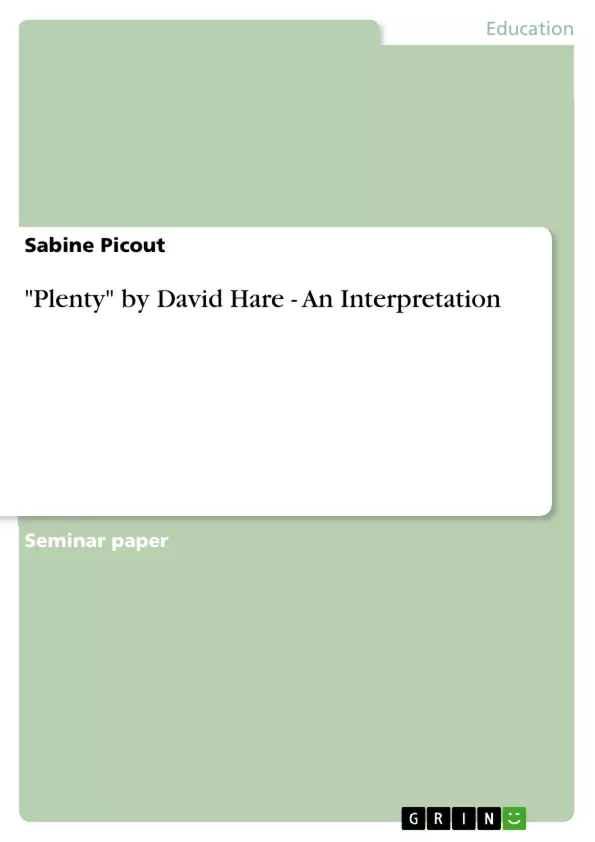In this play Hare not only mentions how difficult it is for the establishment to give up their idealistic vision of the continuation of the Empire but he also portrays the partnership between England and America. By describing personal experiences of his characters he reflects the political mood of the time. The disillusion and the lack of direction of his characters who can’t cope with their situation is comparable to the political conditions. “Within the context of English political history these events are not extraneous, coincidental happenings; they have a direct bearing on and relationship to the characters’ actions and thoughts. We do not see the events take place, but we see their impact on English lives“ 8 .
But Hare’s work is not only a historical play but also somehow a tragedy. Critics claim that the dramas hero is destructive and that the play is “essentially tragic” 9 .
Susan belongs to one of Hare’s characters that share “a tragic sense of life …against the odds, they defy the repression and inhumanity around them even if it means self-destruction. 10 ”
Table of Contents
- Title of the Play and Sub-genre
- Summary of the Play and its Structure
- Main Characters
- Interpretation of Important Ideas
- Structure of the Play
- Summary
- The Characters of the Play
Objectives and Key Themes
This analysis aims to explore the themes, characters, and structure of David Hare's play "Plenty." It will delve into the play's portrayal of post-war British society, focusing on the psychological impact of affluence and the challenges faced by individuals transitioning back to civilian life.
- The transition from war to peace and the disillusionment of a wartime generation.
- The corrosive effects of wealth and the loss of ideals in a consumer society.
- The psychological impact of war and its lasting consequences on individuals.
- The complexities of human relationships and the difficulty of finding fulfillment.
- The role of the individual within a changing societal context.
Chapter Summaries
The analysis begins by discussing the play's title and its categorization as a historical drama. It then provides a brief overview of the play's structure and its central themes, highlighting the play's focus on the post-war period and the decline of the British Empire. The analysis then introduces the key characters, specifically Susan Traherne, and delves into their motivations and experiences.
The analysis continues by exploring the play's structure, noting the non-linear timeline and the use of flashbacks. It examines how this structure contributes to the play's overall impact. The analysis also includes a detailed summary of the play's plot, focusing on the protagonist's journey and the challenges she faces.
The final part of the analysis focuses on the characters of the play, particularly Susan Traherne. The analysis explores her psychological complexities and the motivations behind her actions. It also discusses the play's broader themes, such as the search for meaning in a world of abundance and the consequences of moral disorientation.
Keywords
The primary keywords and focus topics of this analysis include: post-war Britain, historical drama, disillusionment, consumer society, psychological impact of war, transition to peace, wealth and ideals, human relationships, individual and society, Susan Traherne.
- Quote paper
- MMag. Dr. Sabine Picout (Author), 2004, "Plenty" by David Hare - An Interpretation, Munich, GRIN Verlag, https://www.grin.com/document/188973



